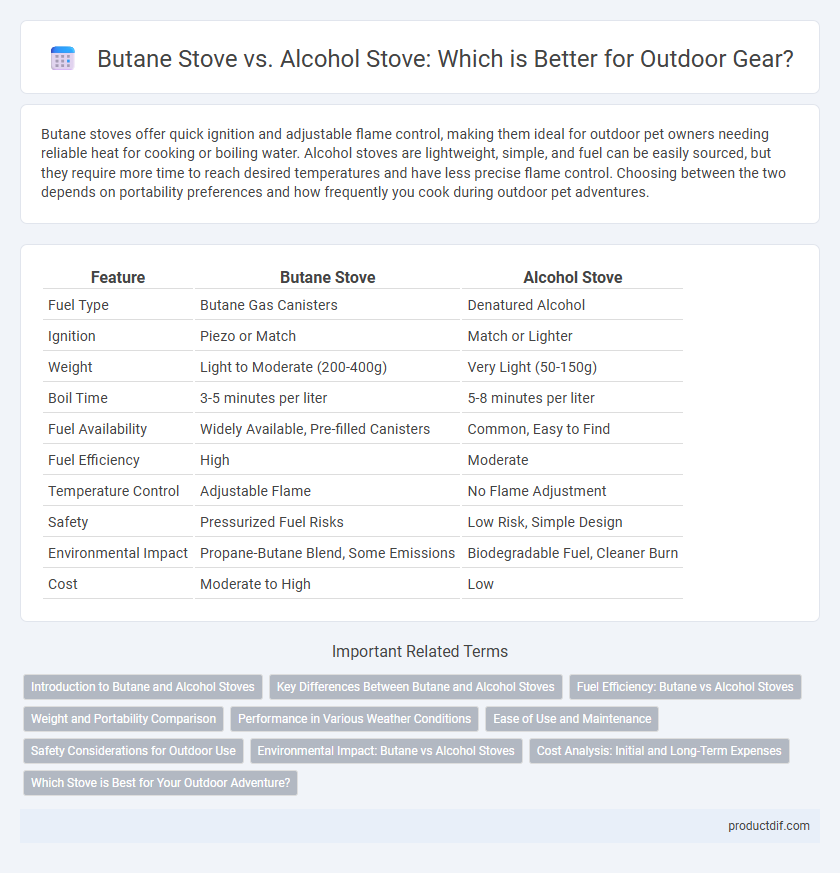Butane stoves offer quick ignition and adjustable flame control, making them ideal for outdoor pet owners needing reliable heat for cooking or boiling water. Alcohol stoves are lightweight, simple, and fuel can be easily sourced, but they require more time to reach desired temperatures and have less precise flame control. Choosing between the two depends on portability preferences and how frequently you cook during outdoor pet adventures.
Table of Comparison
| Feature | Butane Stove | Alcohol Stove |
|---|---|---|
| Fuel Type | Butane Gas Canisters | Denatured Alcohol |
| Ignition | Piezo or Match | Match or Lighter |
| Weight | Light to Moderate (200-400g) | Very Light (50-150g) |
| Boil Time | 3-5 minutes per liter | 5-8 minutes per liter |
| Fuel Availability | Widely Available, Pre-filled Canisters | Common, Easy to Find |
| Fuel Efficiency | High | Moderate |
| Temperature Control | Adjustable Flame | No Flame Adjustment |
| Safety | Pressurized Fuel Risks | Low Risk, Simple Design |
| Environmental Impact | Propane-Butane Blend, Some Emissions | Biodegradable Fuel, Cleaner Burn |
| Cost | Moderate to High | Low |
Introduction to Butane and Alcohol Stoves
Butane stoves utilize pressurized butane gas cartridges, offering quick ignition and adjustable flame control, ideal for lightweight backpacking and camping. Alcohol stoves burn denatured alcohol or ethanol, valued for simplicity, fuel availability, and safety due to non-pressurized liquid fuel. Both stove types cater to different outdoor needs, with butane stoves providing efficiency and power, while alcohol stoves prioritize reliability and minimal environmental impact.
Key Differences Between Butane and Alcohol Stoves
Butane stoves offer quicker ignition and adjustable flame control compared to alcohol stoves, which provide simplicity and fuel versatility. Butane stoves rely on pressurized gas cartridges, delivering higher heat output, whereas alcohol stoves burn liquid fuel, resulting in lower temperatures but lighter weight and quieter operation. The choice depends on factors such as fuel availability, weight considerations, and specific outdoor cooking needs.
Fuel Efficiency: Butane vs Alcohol Stoves
Butane stoves offer higher fuel efficiency due to their combustion of pressurized gas, providing consistent heat output and quick ignition ideal for low temperatures and high altitudes. Alcohol stoves burn a liquid fuel with a lower energy density, resulting in longer boil times and less efficient fuel consumption, but they are lightweight and use widely available fuel. Choosing between butane and alcohol stoves depends on balancing fuel efficiency needs with factors like weight, fuel availability, and environmental conditions.
Weight and Portability Comparison
Butane stoves typically weigh between 10 to 15 ounces and feature compact designs, making them highly portable for backpacking and camping trips. Alcohol stoves are notably lighter, often under 5 ounces, and have minimalist builds that fit easily into small packs, ideal for ultralight hikers. The choice between butane and alcohol stoves ultimately depends on balancing the slightly heavier butane setup with its ease of use against the ultra-lightweight and simplicity of alcohol stoves for maximum portability.
Performance in Various Weather Conditions
Butane stoves perform optimally in moderate temperatures but lose efficiency and may struggle to ignite in extreme cold due to reduced fuel vaporization. Alcohol stoves maintain consistent performance in cold and wet weather because alcohol burns at a lower temperature and vaporizes easily, making them reliable for winter camping and high-altitude conditions. Both stove types are lightweight and portable, but alcohol stoves offer greater versatility across diverse weather scenarios without the need for pressurized fuel canisters.
Ease of Use and Maintenance
Butane stoves offer quick ignition and simple flame control, making them highly convenient for outdoor use without requiring extensive setup. Alcohol stoves, while lightweight and reliable, often need manual priming and careful fuel handling, which can be less user-friendly for beginners. In terms of maintenance, butane stoves typically require less cleaning and upkeep compared to alcohol stoves, which can accumulate residue and need regular scrubbing to maintain optimal performance.
Safety Considerations for Outdoor Use
Butane stoves offer reliable flame control and quick ignition but require vigilance due to flammability risks and pressure sensitivity in cold temperatures. Alcohol stoves are simpler with a lower explosion risk and can burn denatured alcohol or methanol, providing a safer option for beginners despite slower cooking times. Both types demand proper ventilation and stable surfaces to minimize hazards during outdoor use.
Environmental Impact: Butane vs Alcohol Stoves
Butane stoves emit greenhouse gases like carbon dioxide and unburned hydrocarbons, contributing to air pollution and climate change. Alcohol stoves burn cleaner, producing fewer pollutants and lower carbon emissions, making them a more environmentally friendly option. However, the sourcing and production of both fuels impact their overall environmental footprint, with renewable ethanol-based alcohol fuel often preferred for sustainability.
Cost Analysis: Initial and Long-Term Expenses
Butane stoves generally have a higher initial cost, ranging from $30 to $100, while alcohol stoves are typically priced between $10 and $40, making them more budget-friendly upfront. Long-term expenses for butane stoves include purchasing butane canisters, which can cost around $3 to $5 each and may require frequent replacement, whereas alcohol stoves use denatured alcohol, a cheaper and more readily available fuel option costing approximately $2 to $4 per liter. Considering fuel efficiency and availability, alcohol stoves offer lower ongoing costs, making them ideal for extended trips or remote areas where fuel resupply is limited.
Which Stove is Best for Your Outdoor Adventure?
Butane stoves offer rapid ignition, adjustable flame control, and clean burning, making them ideal for quick meals and variable weather conditions during outdoor adventures. Alcohol stoves are lightweight, simple, and reliable with fuel easily sourced or improvised, perfect for ultralight backpacking and emergency situations. Choosing the best stove depends on your priorities: butane for efficiency and convenience, alcohol for portability and fuel availability.
Butane Stove vs Alcohol Stove Infographic

 productdif.com
productdif.com